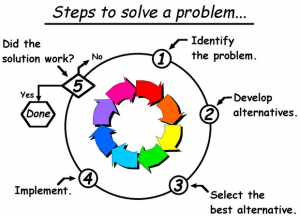 Solutions Anyone… Before you file your DBA paperwork or register your website, ask yourself this question: “What problem am I solving?”
Solutions Anyone… Before you file your DBA paperwork or register your website, ask yourself this question: “What problem am I solving?”
I've seen some of the most promising entrepreneurs of our time crash and burn because their genius idea never actually solved a problem. They could think that making a specific product is a great idea, and potentially profitable, but if there's no market demand for that specific product, the business will surely fail. Every great innovation we've seen has not necessarily been because the inventor or entrepreneur had a great idea. It's because they saw an opportunity in the market, identified a problem and were uniquely positioned to solve that problem.
Especially in this mobile app boom, seemingly everyone is just one great idea from developing the next big thing. Instead of approaching this as solving a major issue, they only see the payoff.
If you want proof of this, look at the App Store on your phone. No matter what category you look at, you'll find mountains upon mountains of half-baked apps, all trying to cash out through ad revenue or through being bought out by a larger company.
How many bubble shooter games do we really need? How many low-budget Snapchat ripoffs are really going to get downloaded now? The answer: little to none. It's amazing that business leaders can see a long list of well-heeled competitors who already have traction in the market and still think, “Yeah, I can succeed here.”
I've built my business not because I had a burning passion to get into real estate. I've come this far because I saw an opportunity and  studied the problem. After figuring out that I do have a unique angle, I started building my empire. My first step wasn't predicting how much money this company would make me. It was noticing a gap in the market, and realizing that I have the means to bridge that gap.
studied the problem. After figuring out that I do have a unique angle, I started building my empire. My first step wasn't predicting how much money this company would make me. It was noticing a gap in the market, and realizing that I have the means to bridge that gap.
Here's a simple process you should follow before trying to make a name for yourself:
1) Ask yourself, “Is there a problem in my field?” This is crucial and often skipped. If your market is full of competitors and supply is ahead of demand, this is probably not the best time to launch a venture. If your biggest competitors all share a fatal flaw, one that is advantageous to you, then it might be time to explore that problem. If demand outpaces supply and you hear comments about a lack of quality options in the market, then the industry may have a problem.
2) Determine how the problem started Another step that is often overlooked. Before you jump in, study the problem. What are the current companies doing? How are they failing customers and clients? Where are they succeeding? When you can understand the root cause of why a problem exists in your industry, you can build your business around that issue.
3) Determine if you are positioned to take advantage Once you've found the problem and studied it, now it's time to look inward. Study your own strengths and weaknesses to see if they're aligned correctly with the problem. If all the ice cream shops in town specialize in vanilla ice cream, but you've got an amazing chocolate recipe, maybe it's time to open up shop. Learn what the potential customers and clients want — and how the current landscape is not meeting their needs.
4) Build your business around that problem After the three aforementioned steps have been satisfied, now you can get to work. You've identified a need in the market, and now you can build the solution to that need. Your whole focus, when starting out, should be on building up that solution.The problem could be substandard service by existing competitors. In that case, specialize in the things that your competitors can't or won't do. If every other company in your field has a sky-high price point, maybe you can be that entry-to-mid level competitor customers want. Southwest Airlines has done this to great success.
 It all starts with identifying and solving the problem. If you're entering into entrepreneurship just to make money or get away from the 9-to-5 maze, you're in it for the wrong reasons. You'll be forced out soon enough, going back to your cubicle.
But if you have a burning passion to solve an important problem, you have the cornerstone of entrepreneurship in mind.
It all starts with identifying and solving the problem. If you're entering into entrepreneurship just to make money or get away from the 9-to-5 maze, you're in it for the wrong reasons. You'll be forced out soon enough, going back to your cubicle.
But if you have a burning passion to solve an important problem, you have the cornerstone of entrepreneurship in mind.


Founder of Lazarus Enterprises Group and head of strategy at Apex Media 365, also Apex Marketing Pro, a leading digital marketing firm.
We developed a system to help small businesses, and local companies connect with potential clients, and customers who truly need their goods or services, which will in-turn increase the company’s net worth with a lot more ease, and control.
We do this utilizing Gorilla marketing tactics, and technology to measure a return on investment.
To schedule a free 30-minute Marketing Tune-up, call us: 1-888-256-4202
